| Srl | Item |
| 1 |
ID:
157570
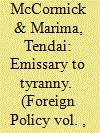

|
|
|
| 2 |
ID:
061932
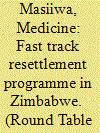

|
|
|
| 3 |
ID:
096485
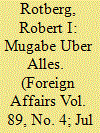

|
|
|
| 4 |
ID:
178383
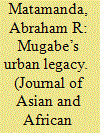

|
|
|
|
|
| Summary/Abstract |
Robert Gabriel Mugabe resigned as the President of Zimbabwe in 2017 after being in office since 1980 when Zimbabwe gained independence from British colonial rule. Mugabe implemented various policies that impacted on the urbanscape of Zimbabwe. Using a desktop approach that is based on bibliography research, the study examines Mugabe’s urban legacy through the lenses of postcolonial theory and the concept of Mugabeism. The results show that power was a dominant feature in Mugabe’s legacy, as he used it to influence the socio-spatial configuration of the urban scape whenever he saw it befitting. His power was rooted in corruption, clientism, patronage, state capture and sanctioning of opponents. Essentially, Mugabe perpetuated the colonial city, in that the postcolonial city was a replication of the socio-spatial segregation which existed during the colonial era, yet this time round it was based on class and not race.
|
|
|
|
|
|
|
|
|
|
|
|
|
|
|
|
| 5 |
ID:
172815
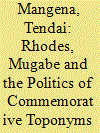

|
|
|
|
|
| Summary/Abstract |
This paper is based on former Zimbabwean President Robert Gabriel Mugabe’s ninety-third birthday celebrations. It uses and goes beyond the said ceremony to interrogate the politics of commemorative toponyms in post-independence Zimbabwe. The event took place on 25 February 2017 at a school whose name Rhodes Estate Preparatory School (REPS) was changed to Matopos Junior School prior to the celebrations. The methodological framing of this discussion consists of a critical reading of the media’s representation of the name change and the debates that followed. Reference is specifically made to two Zimbabwean newspapers, The Patriot, which featured the story on 2 March 2017 under the heading “Rhodes ‘legacy’ finally put to rest” and the ZimEye’s story of 26 February 2017 headlined “Mugabe removes Rhodes.” Theoretically, the paper is framed within the critical approach to toponymy that interprets commemorative place-nomenclature as political arenas which could be used to think through issues of history and memory. In particular, it is argued in this paper that in post-independence Zimbabwe, place names, especially commemorative toponyms, are political spaces par excellence which we can use to study not only the country’s colonial history but also its postcolonial realities.
|
|
|
|
|
|
|
|
|
|
|
|
|
|
|
|
| 6 |
ID:
069376
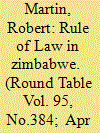

|
|
|
| 7 |
ID:
084889
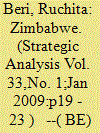

|
|
|
| 8 |
ID:
069411
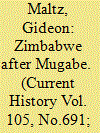

|
|
|
| 9 |
ID:
069372
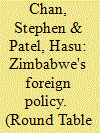

|
|
|
| 10 |
ID:
101587
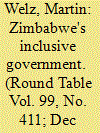

|
|
|
|
|
| Publication |
2010.
|
| Summary/Abstract |
Zimbabwe seemed to be in a political transition-but only on the surface. In actual fact, the new government established under the power-sharing agreement between President Mugabe and newly elected Prime Minister Morgan Tsvangirai proved unsuccessful in its first 100 days owing to continued rivalry and a lack of commitment on behalf of Mugabe and his party. Mugabe managed to secure key positions in the new government for his cronies. They continued to control the relevant security organs as well as the Reserve Bank, which held a key position because its Governor guarded the budget available for the new ministers. Consequently, sabotage was an imminent threat for the new government. Mugabe benefited from the weakness of the opposition, which was split and had an indecisive and uncharismatic leader who failed to secure financial support from the West. To complicate the situation even further there were more players involved in the political arena of Zimbabwe, including the two major farmers' groupings, an emerging third party under Simba Makoni, the trade unions and white businessmen. They all had their own agenda. Mugabe and his ruling clique relied on each other as they had both committed gross human rights violations over the last 25 years. They either fall together or their mutual dependency keeps them going. Change was unlikely to occur; even the new Movement for Democratic Change ministers were aware of this.
|
|
|
|
|
|
|
|
|
|
|
|
|
|
|
|